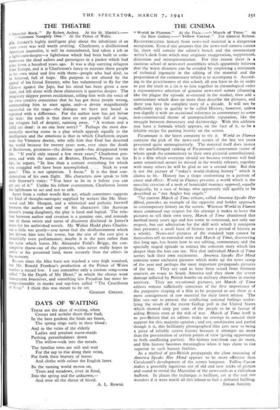THE THEATRE
Thunder Rock." By Robert Ardrey. At the St. Martin's.— - Nineteen Naughty One." At the Prince of Wales.
git. A LIMEY'S highly intelligent play about the inhabitant of an ivory tower was well worth reviving. Charleston, a disillusioned American journalist, it will be remembered, had taken a job as a lighthouse-keePer—a lighthouse which had been built to com- memorate the dead sailors and passengers in a packet which had gone down a hundred years ago. It was a ship carrying refugees from Europe, and it is Charleston's fancy to recreate these people in his own mind and live with them—people who had died, so he believed, full of hope. His purpose is not altered by the appeal of his friend Streeter, who has volunteered to fly for the Chinese against the Japs, but his mind has been given a new slant, and left alone with these characters it quarries deeper. The imaginary skipper proves recalcitrant, telling him with the voice of his own creative conscience that he has got these people wrong, commanding him to start again, and—a device magnificently successful on the stage—the dialogue we have just heard is repeated with a difference. For the author now has got below the skin: the truth is that these are not people full of hope, but refugees full of despair, running away. "A woman and a child are dead : is no one here sorry?" Perhaps the most dra- matically moving scene in a play which appeals equally to the intelligence and the emotions is that in which Charleston argues with the Viennese doctor, who tells him that God has deserted the world because for twenty years now, ever since the death of Beethoven, greatness—the divine spark—has disappeared from life. "If you'd only stayed a few more years," Charleston pro- tests, and with the names of Brahms, Darwin, Pasteur on his lips, he argues, "In less than a century everything for which you struggled will have been accomplished. . . . Stick to your guns! This is not optimism. I know." It is the final con- demnation of his own flight. His characters now speak to him with Streeter's voice: "You have to be in it before you can get out of it." Unlike his fellow countrymen, Charleston leaves the lighthouse to act and not to talk.
Apart from a rather wordy first act, which sometimes suggests the kind of thought-surrogate supplied by writers like Mr. Sher- wood and Mr. Morgan, and a whimsical and pathetic farewell between the author and one of his characters (the Austrian doctor's young daughter), the play is hard and logical. The rela- tion between author and creation is a genuine one, and reminds one of those twists and turns of discovery disclosed in James's notes for his unfinished novels. Mr. Walter Hudd plays Charles- ton a little too gently—you never feel the disillusionment which has driven him into his tower, but the rest of the cast give a beautifully even performance; maybe it is the part rather than the actor which leaves Mr. Alexander Field's Briggs, the con- sumptive throw-out of the potteries, who never really hopes to arrive at his promised land, more securely than the others in the memory.
Revues since the blitz have not reached a very high standard, but Mr. Ronald Frankau's production at the Prince of Wales reaches a record low. I can remember only a curious song-scena called "In the Depth of My Heart," in which the chorus wore transparent brassieres, and something less Freudian but more in- comprehensible in masks and top-hats called "The Crucifixion of Song." I think this was meant to be art.
GRAHAM GREENE.






























 Previous page
Previous page